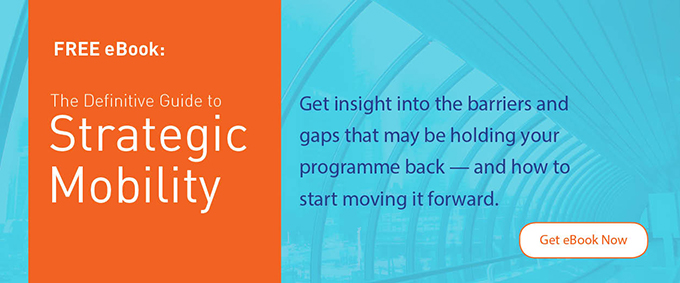
5 things you need to know to drive Mobility forward
By: Joe Jackson, Vice President – Global Business Strategy
You want to push Mobility forward for your company. But amid significant evolutionary trends — including shorter assignments, global uncertainties and a workforce craving international experience — where do you begin? Our blog series, “Transformative Insight for the World Ahead”, explores emerging challenges as you strive to leverage your programme as a key differentiator for people on the move.
“I don’t know.” It’s a phrase you try to avoid. Especially since you’ve spent the vast majority of your career relying on what you know to make fast, smart decisions. So what happens when you’re facing an uncertain future in which there’s simply no way of knowing what tomorrow will bring? Recent political and social variables have put Mobility in a state of flux when it comes to immigration, economies, compliance and more. You’re tasked with navigating these emotionally-charged issues quickly without compromising your ability to help individuals transition into new roles in new places. By studying your Mobility programme from the inside, you can make sense of the changes. You can prepare for them. And most importantly, you can use them to your advantage.
Here are the 5 things you need to know:
- The workforce is getting younger. By the year 2025, millennials will comprise about 75% of the workforce. More technology-savvy than their predecessors, this group demands information at their fingertips. And even though they value collaboration, they realise they can work from anywhere — even another company. This group is more likely to jump from one job to the next more than other demographic groups. In addition, not only do 84% of millennials endorse relocating for a job, a whopping 82% believe it’s necessary for career advancement.
Impact: Improve technologies to ensure information can be shared faster than ever before. And, prepare for even more relocation engagements as the demographic that has most embraced relocations as a career path move into talent management leadership roles.
- Mobility is a transformative business strategy. You know Mobility isn’t a sunk cost. Do your fellow business leads and top executives know that? Use data to provide insights, to prove its value to the overall business strategy, and to strengthen your mobility programme’s brand (i.e. how it’s viewed by others in the organisation).
Impact: Work with other leaders to use Mobility to promote expansion. Grow your brand. And even grab new business in new regions of the world.
- Important information is lost in the silo. You know knowledge runs deep, but it’s hard to uncover. Others throughout your organisation — including those most affected by your Mobility strategy — have valuable insight into how to improve it. But do they have the voice to do so? Do you have the channels in place to receive it? Identify gaps between functional units that are preventing you from capturing valuable insight.
Impact: You already know the value of fast, timely information. So why not simplify how you access the information — and how you share it with others — by eliminating the gaps between key functional teams in your organisation.
- Strategies go further than policies. Mobility policies help you gain consistency when performing the same tasks repeatedly. But what about when you don’t even know what you need to do yet? A Mobility strategy helps you prepare for anything. You can use it to set priorities, offer a collective vision moving forward, and even to shape policies. Plus, by letting every group have input, you can brace for new challenges and emerging opportunities.
Impact: With a unified Mobility strategy, every key stakeholder knows the ultimate objective. So regardless of what’s happening around the world, you’re always on solid ground in responding to changes and capitalising on opportunities.
- Data leads to expert advice. Are you aware of all the different systems housing the information and data you need? Find out where critical information is being withheld. Then, find out how to share it with others throughout your organisation to measure your programme’s performance and find areas of improvement and opportunity.
Impact: Collaborate with internal and external experts to unlock your information — and your programme’s potential. By knowing what you have, you can create a customised strategy to improve deficiencies and prioritise next steps to capture new opportunities.
Right decisions. Right time.
You have everything you need to prepare for anything. It’s simply a matter of making it accessible and using it to make the right decisions at the right time.
